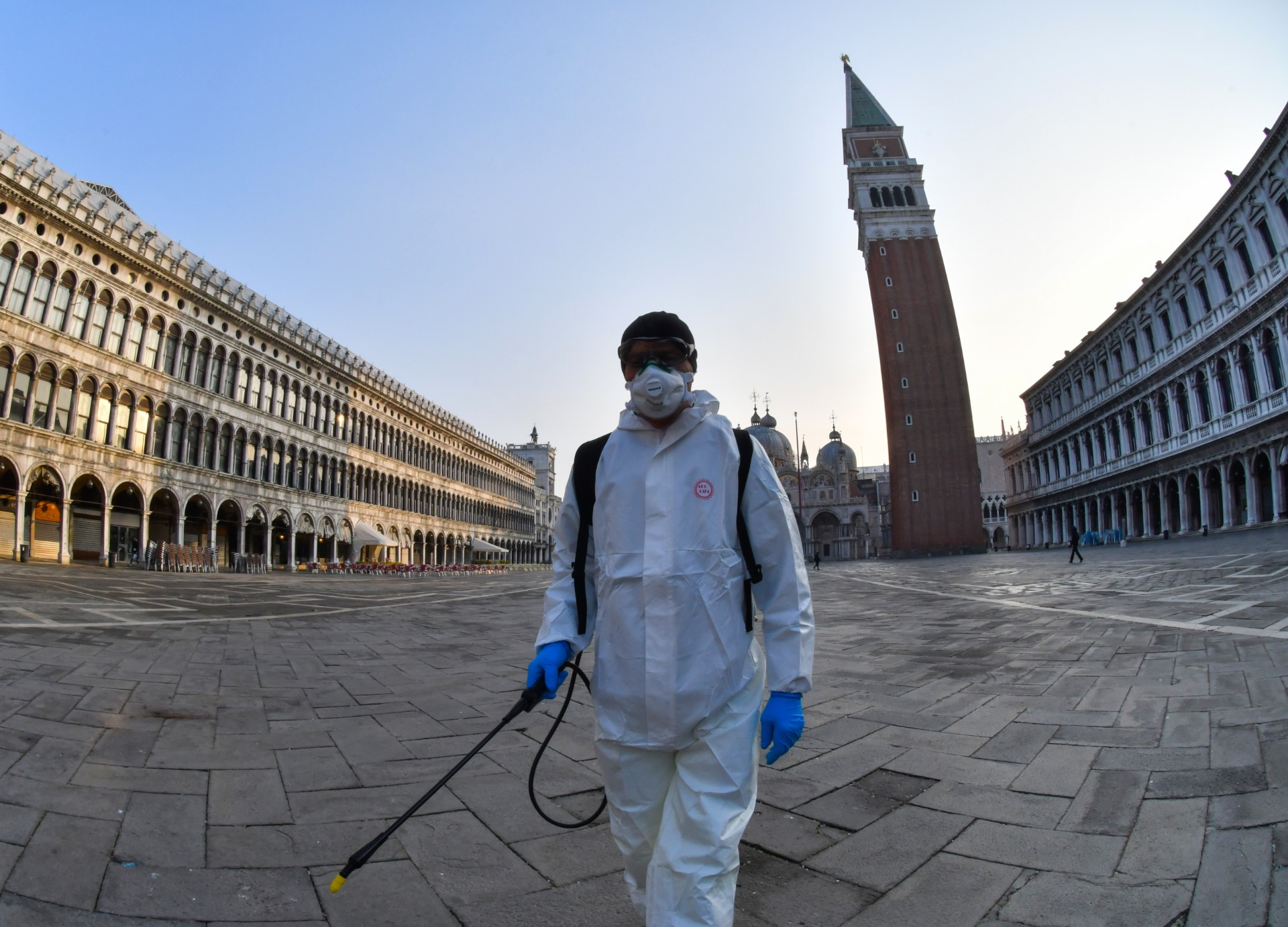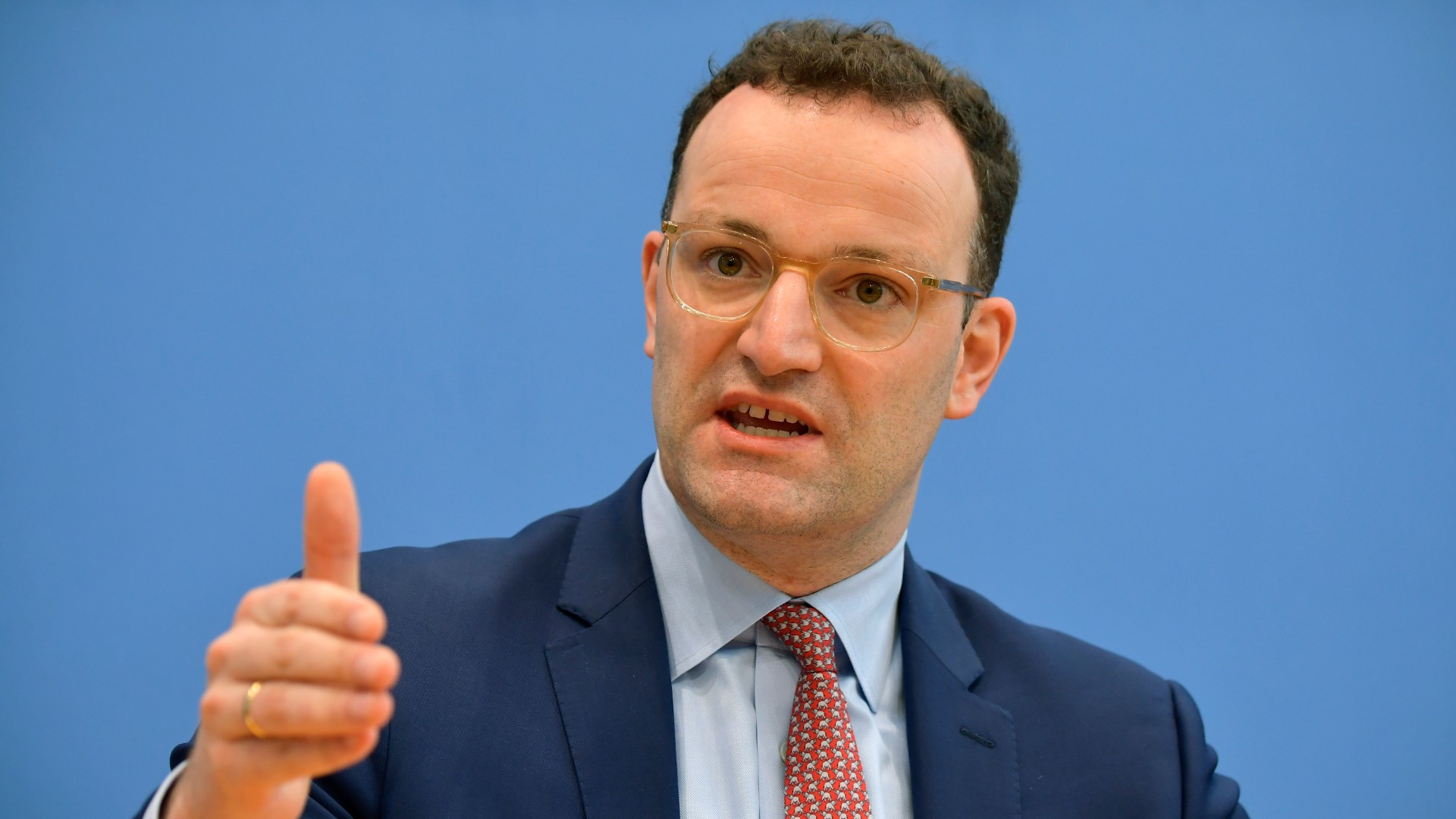
A health worker sprays disinfectant in St Mark's Square, Venice. /Marco Sabadin/AFP
TOP HEADLINES
-
Europe's worst-affected country, ** Italy, now has more than 10,000 confirmed cases** . The Italian death toll jumped on Tuesday by 168 to 631, Europe's largest single-day rise to date
-
Citing experts, Germany's chancellor Angela Merkel has warned that 60 to 70 percent of the population will be infected
-
The UK cuts interest rates from 0.75 percent to 0.25 percent – its joint-lowest ever – as its government prepares the annual budget
-
Moldova closes all its nurseries, schools, colleges and universities for two weeks from Wednesday. The country has reported three cases, with no deaths so far
-
All Polish schools will close from Monday . Poland, which will also close museums and cinemas, has 26 confirmed cases but no deaths so far
-
**Ukraine (one case so far) will close schools, universities and cinemas **in the capital Kyiv from Thursday until the end of March and restrict mass events such as concerts and conferences
-
Austrian rail operator OBB suspends all passenger train connections to and from Italy . Freight will continue but the 20 or so daily passenger services are suspended until further notice
-
**The****UK's health minister, Nadine Dorries, tests positive **and is in self-quarantine
-
Italy's prime minister Giuseppe Conte refuses to rule out a stricter lockdown in Lombardy , including the closure of shops, offices and public transport. Italy has 10,149 cases and 631 deaths
-
Belgium suffers its first COVID-19 fatality , the health ministry announcing the death of a 90-year-old patient
-
A British woman in Bali becomes the first COVID-19 death in Indonesia , which has 27 cases. The victim was 53 and already critically ill with diabetes, hypertension, hyperthyroidism and chronic obstructive pulmonary disease
-
Wednesday night's Manchester City vs Arsenal soccer fixture becomes the **first English Premier League game to be called off **after it emerges some Arsenal players met Olympiakos and Nottingham Forest owner Evangelos Marinakis, who has tested positive
-
Outside Europe, the U.S. now has more than 1,000 cases, according to the Johns Hopkins University; Panama reports the first virus-linked death in Central America ; new countries reporting cases include Bolivia, DR Congo, Jamaica and Turkey ; and some industries in Wuhan, the epicenter of the outbreak in China, are to return to work , says the local government

Germany's health minister Jens Spahn at a press conference in Berlin. /Tobias Schwarz/AFP
ACROSS EUROPE
By Natalie Carney in Munich
With close to 1,500 confirmed cases and two deaths, Germany is currently one of Europe's most affected countries – yet Berlin is still acting somewhat cautiously when it comes to its response.
Some schools and offices around the country have been closed after positive cases were detected, and authorities have strongly recommended events with more than 1,000 people be canceled.
The southern state of Bavaria, the second most affected region in the country, has prohibited them altogether. Measures are also being developed to implement drive-through testing stations.
Residents of Germany have been advised to avoid unnecessary travel to high-risk areas, most notably Italy, while some countries have implemented two-week self-quarantine measures for anyone traveling from Germany. Signs asking people not to shake hands have also been seen in office buildings across the country, while many people have taken the decision to work from home.
Germany's health minister, Jens Spahn, has warned that the virus will change "daily life" as authorities take calculated measures to try to contain the outbreak. Spahn called on everyone to pull together as the coronavirus is a "great challenge for society as a whole."
Berlin is reported to have allocated one billion euros ($1.13 billion) to support research and medical efforts.
By Toni Waterman in Brussels
Belgium has recorded its first COVID-19 death, that of a 90-year-old patient.The country had 267 confirmed cases as of Tuesday.
Meanwhile, the European Union plans to step up its financial response to the disease, pledging to mobilize $28 billion in aid. The money will go towards supporting national health care systems, small and medium-sized businesses, workers and other vulnerable parts of the economy. On Tuesday, Brussels announced plans to ease slot rules for airlines, which mandate carriers use 80 percent of their take-off and landing times or they lose them the following year.
Plans of the aid package emerged after EU leaders held an emergency teleconference late on Tuesday, but reports that the money comes from previously allocated funds has raised concerns over how effective it will be.
European Commission President Ursula Von der Leyen said she will seek clarification from EU finance ministers on spending limits and public subsidies during health emergencies. This would allow EU governments to spend more to help cushion the blow from the coronavirus.
Austria became the first country in the free-movement Schengen area to shut its borders to people arriving from Italy, in the face of calls for European solidarity and a coordinated response during the outbreak.
By Isobel Ewing in Budapest
One of Poland's top armed forces generals, Jaroslaw Mika, has tested positive for COVID-19 after returning from a military conference in Germany. Mika took part in a conference on strategic communication on 6 March in Wiesbaden. On 11 March, the country had 17 confirmed cases and has canceled all mass events.
Also as of 11 March, 13 people were confirmed to have the coronavirus in Hungary. The latest case is a Hungarian woman who had contact with the British man in Debrecen already known to be infected.
According to the government, 67 people are in quarantine and 362 people have been tested. A nationwide ban on visiting at all hospitals and nursing homes has been implemented and will stay in place until further notice.
The Hungarian government says the economic impact of the virus is already visible, with a 40 to 50 percent cancellation rate in the hotel industry. On Tuesday, the country's prime minister, Viktor Orban, told Hungarians to brace themselves for a "pandemic" and announced Hungary was working on a multibillion-euro crisis fund to help affect industries.

A masked man outside a Rome pharmacy. /Alberto Pizzoli/AFP
MARKETS AND BUSINESS
-
Italian PM Giuseppe Conte says his **government has set aside $28 billion **to help the economy overcome the outbreak
-
The UK slashes interest rates to 0.25 percent , its joint lowest-ever, from 0.75 percent as its government prepares its annual budget
-
After rallying on Tuesday, Asia shares sunk overnight . Japan's Nikkei average lost 2.3 percent to a near 15-month low of 19,416.06; South Korea's KOSPI lost 2.78 percent to its lowest close since January 2017; and in Hong Kong, the Hang Seng Index closed down 0.63 percent
-
European Central Bank president **Christine Lagarde urges European Union leaders to spend **in the fight against COVID-19
-
London's Heathrow Airport passenger numbers for February were down 4.8 percent year-on-year, falling to 5.4 million as demand was hit by coronavirus fears
-
KLM is to cancel flights to Milan, Venice and Naples , but will continue to serve other Italian cities
-
Finnish shipping company Viking Line has issued a coronavirus-based profit warning . It operates Baltic Sea ferries between Finland, Sweden and Estonia
FROM OUR GLOBAL COLLEAGUES
**From CGTN in China: **
Can history shed light on Wall Street's coronavirus panic?
**From CGTN America: **
COVID-19 fears rattle global markets
** (panel discussion)**
**From CGTN in China: **
China sends anti-epidemic experts to help Italy
**From CGTN in Africa: **
DR Congo confirms first case
Source(s): Reuters
 简体中文
简体中文



